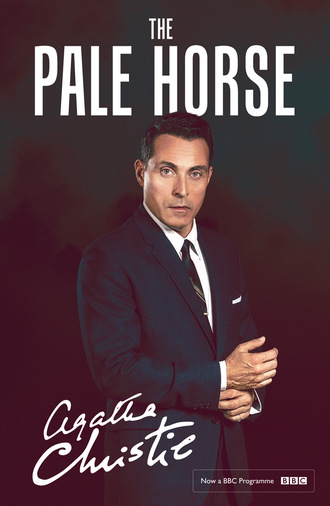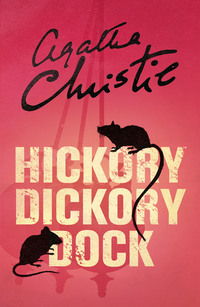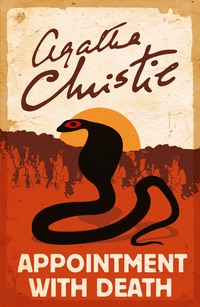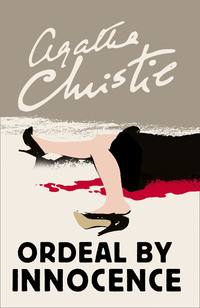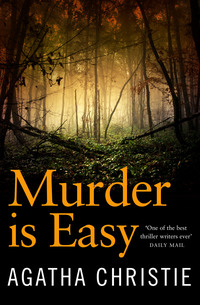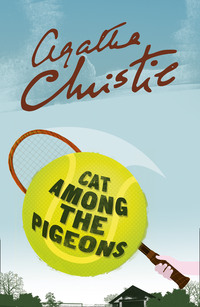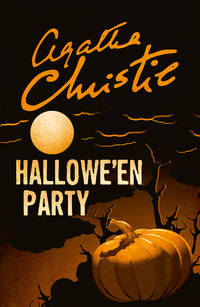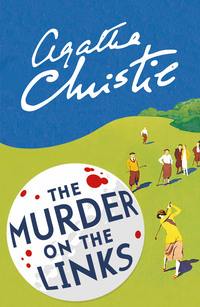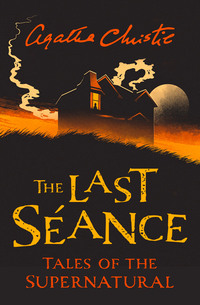But there had been a crucifix, tucked away at the bottom of the suitcase. Lejeune did not mention it. He sat listening.
‘I saw young Mike in the street and I sent him for that Father Gorman at St Dominic’s. And I rang for the doctor, and the hospital on my own account, not saying nothing to her.’
‘You took the priest up to her when he came?’
‘Yes, I did. And left them together.’
‘Did either of them say anything?’
‘Well now, I can’t exactly remember. I was talking myself, saying here was the priest and now she’d be all right, trying to cheer her up, but I do call to mind now as I closed the door I heard her say something about wickedness. Yes—and something, too, about a horse—horse-racing, maybe. I like a half-crown on myself occasionally—but there’s a lot of crookedness goes on in racing, so they say.’
‘Wickedness,’ said Lejeune. He was struck by the word.
‘Have to confess their sins, don’t they, Romans, before they die? So I suppose that was it.’
Lejeune did not doubt that that was it, but his imagination was stirred by the word used. Wickedness …
Something rather special in wickedness, he thought, if the priest who knew about it was followed and clubbed to death …
There was nothing to be learnt from the other three lodgers in the house. Two of them, a bank clerk and an elderly man who worked in a shoe shop, had been there for some years. The third was a girl of twenty-two who had come there recently and had a job in a nearby department store. All three of them barely knew Mrs Davis by sight.
The woman who had reported having seen Father Gorman in the street that evening had no useful information to give. She was a Catholic who attended St Dominic’s and she knew Father Gorman by sight. She had seen him turn out of Benthall Street and go into Tony’s Place about ten minutes to eight. That was all.
Mr Osborne, the proprietor of the chemist’s shop on the corner of Barton Street, had a better contribution to make.
He was a small, middle-aged man, with a bald domed head, a round ingenuous face, and glasses.
‘Good evening, Chief Inspector. Come behind, will you?’ He held up the flap of an old-fashioned counter. Lejeune passed behind and through a dispensing alcove where a young man in a white overall was making up bottles of medicine with the swiftness of a professional conjurer, and so through an archway into a tiny room with a couple of easy-chairs, a table and a desk. Mr Osborne pulled the curtain of the archway behind him in a secretive manner and sat down in one chair, motioning to Lejeune to take the other. He leaned forward, his eyes glinting in pleasurable excitement.
‘It just happens that I may be able to assist you. It wasn’t a busy evening—nothing much to do, the weather being unfavourable. My young lady was behind the counter. We keep open until eight on Thursdays always. The fog was coming on and there weren’t many people about. I’d gone to the door to look at the weather, thinking to myself that the fog was coming up fast. The weather forecast had said it would. I stood there for a bit—nothing going on inside that my young lady couldn’t deal with—face creams and bath salts and all that. Then I saw Father Gorman coming along on the other side of the street. I know him quite well by sight, of course. A shocking thing, this murder, attacking a man so well thought of as he is. “There’s Father Gorman,” I said to myself. He was going in the direction of West Street, it’s the next turn on the left before the railway, as you know. A little way behind him there was another man. It wouldn’t have entered my head to notice or think anything of that, but quite suddenly this second man came to a stop—quite abruptly, just when he was level with my door. I wondered why he’d stopped—and then I noticed that Father Gorman, a little way ahead, was slowing down. He didn’t quite stop. It was as though he was thinking of something so hard that he almost forgot he was walking. Then he started on again, and this other man started to walk, too—rather fast. I thought—inasmuch as I thought at all, that perhaps it was someone who knew Father Gorman and wanted to catch him up and speak to him.’
‘But in actual fact he could simply have been following him?’
‘That’s what I’m sure he was doing now—not that I thought anything of it at the time. What with the fog coming up, I lost sight of them both almost at once.’
‘Can you describe this man at all?’
Lejeune’s voice was not confident. He was prepared for the usual nondescript characteristics. But Mr Osborne was made of different mettle to Tony of Tony’s Place.
‘Well, yes, I think so,’ he said with complacency. ‘He was a tall man—’
‘Tall? How tall?’
‘Well—five eleven to six feet, at least, I’d say. Though he might have seemed taller than he was because he was very thin. Sloping shoulders he had, and a definite Adam’s apple. Grew his hair rather long under his Homburg. A great beak of a nose. Very noticeable. Naturally I couldn’t say as to the colour of his eyes. I saw him in profile as you’ll appreciate. Perhaps fifty as to age. I’m going by the walk. A youngish man moves quite differently.’
Lejeune made a mental survey of the distance across the street, then back again to Mr Osborne, and wondered. He wondered very much …
A description such as that given by the chemist could mean one of two things. It could spring from an unusually vivid imagination—he had known many examples of that kind, mostly from women. They built up a fancy portrait of what they thought a murderer ought to look like. Such fancy portraits, however, usually contained some decidedly spurious details—such as rolling eyes, beetle brows, ape-like jaws, snarling ferocity. The description given by Mr Osborne sounded like the description of a real person. In that case it was possible that here was the witness in a million—a man who observed accurately and in detail—and who would be quite unshakable as to what he had seen.
Again Lejeune considered the distance across the street. His eyes rested thoughtfully on the chemist.
He asked: ‘Do you think you would recognise this man if you saw him again?’
‘Oh, yes.’ Mr Osborne was supremely confident. ‘I never forget a face. It’s one of my hobbies. I’ve always said that if one of these wife murderers came into my place and bought a nice little package of arsenic, I’d be able to swear to him at the trial. I’ve always had my hopes that something like that would happen one day.’
‘But it hasn’t happened yet?’
Mr Osborne admitted sadly that it hadn’t.
‘And not likely to now,’ he added wistfully. ‘I’m selling this business. Getting a very nice price for it, and retiring to Bournemouth.’
‘It looks a nice place you’ve got here.’
‘It’s got class,’ said Mr Osborne, a note of pride in his voice. ‘Nearly a hundred years we’ve been established here. My grandfather and my father before me. A good old-fashioned family business. Not that I saw it that way as a boy. Stuffy, I thought it. Like many a lad, I was bitten by the stage. Felt sure I could act. My father didn’t try to stop me. “See what you can make of it, my boy,” he said. “You’ll find you’re no Sir Henry Irving.” And how right he was! Very wise man, my father. Eighteen months or so in repertory and back I came into the business. Took a pride in it, I did. We’ve always kept good solid stuff. Old-fashioned. But quality. But nowadays’—he shook his head sadly—‘disappointing for a pharmaceutist. All this toilet stuff. You’ve got to keep it. Half the profits come from all that muck. Powder and lipstick and face creams; and hair shampoos and fancy sponge bags. I don’t touch the stuff myself. I have a young lady behind the counter who attends to all that. No, it’s not what it used to be, having a chemist’s establishment. However, I’ve a good sum put by, and I’m getting a very good price, and I’ve made a down payment on a very nice little bungalow near Bournemouth.’
He added:
‘Retire whilst you can still enjoy life. That’s my motto. I’ve got plenty of hobbies. Butterflies, for instance. And a bit of bird watching now and then. And gardening—plenty of good books on how to start a garden. And there’s travel. I might go on one of these cruises—see foreign parts before it’s too late.’
Lejeune rose.
‘Well, I wish you the best of luck,’ he said. ‘And if, before you actually leave these parts, you should catch sight of that man—’
‘I’ll let you know at once, Mr Lejeune. Naturally. You can count on me. It will be a pleasure. As I’ve told you, I’ve a very good eye for a face. I shall be on the lookout. On the qui vive, as they say. Oh yes. You can rely on me. It will be a pleasure.’
CHAPTER 4
Mark Easterbrook’s Narrative
I came out of the Old Vic, my friend Hermia Redcliffe beside me. We had been to see a performance of Macbeth. It was raining hard. As we ran across the street to the spot where I had parked the car, Hermia remarked unjustly that whenever one went to the Old Vic it always rained.
‘It’s just one of those things.’
I dissented from this view. I said that, unlike sundials, she remembered only the rainy hours.
‘Now at Glyndebourne,’ went on Hermia as I let in the clutch, ‘I’ve always been lucky. I can’t imagine it other than perfection: the music—the glorious flower borders—the white flower border in particular.’
We discussed Glyndebourne and its music for a while, and then Hermia remarked:
‘We’re not going to Dover for breakfast, are we?’
‘Dover? What an extraordinary idea. I thought we’d go to the Fantasie. One needs some really good food and drink after all the magnificent blood and gloom of Macbeth, Shakespeare always makes me ravenous.’
‘Yes. So does Wagner. Smoked salmon sandwiches at Covent Garden in the intervals are never enough to stay the pangs. As to why Dover, it’s because you’re driving in that direction.’
‘One has to go round,’ I explained.
‘But you’ve overdone going round. You’re well away on the Old (or is it the New?) Kent Road.’
I took stock of my surroundings and had to admit that Hermia, as usual, was quite right.
‘I always get muddled here,’ I said in apology.
‘It is confusing,’ Hermia agreed. ‘Round and round Waterloo Station.’
Having at last successfully negotiated Westminster Bridge we resumed our conversation, discussing the production of Macbeth that we had just been viewing. My friend Hermia Redcliffe was a handsome young woman of twenty-eight. Cast in the heroic mould, she had an almost flawless Greek profile, and a mass of dark chestnut hair, coiled on the nape of her neck. My sister always referred to her as ‘Mark’s girl friend’ with an intonation of inverted commas about the term that never failed to annoy me.
The Fantasie gave us a pleasant welcome and showed us to a small table against the crimson velvet wall. The Fantasie is deservedly popular, and the tables are close together. As we sat down, our neighbours at the next table greeted us cheerfully. David Ardingly was a lecturer in History at Oxford. He introduced his companion, a very pretty girl, with a fashionable hairdo, all ends, bits and pieces, sticking out at improbable angles on the crown of her head. Strange to say, it suited her. She had enormous blue eyes and a mouth that was usually half-open. She was, as all David’s girls were known to be, extremely silly. David, who was a remarkably clever young man, could only find relaxation with girls who were practically half-witted.
‘This is my particular pet, Poppy,’ he explained. ‘Meet Mark and Hermia. They’re very serious and highbrow and you must try and live up to them. We’ve just come from Do it for Kicks. Lovely show! I bet you two are straight from Shakespeare or a revival of Ibsen.’
‘Macbeth at the Old Vic,’ said Hermia.
‘Ah, what do you think of Batterson’s production?’
‘I liked it,’ said Hermia. ‘The lighting was very interesting. And I’ve never seen the banquet scene so well managed.’
‘Ah, but what about the witches?’
‘Awful!’ said Hermia. ‘They always are,’ she added.
David agreed.
‘A pantomime element seems bound to creep in,’ he said. ‘All of them capering about and behaving like a three-fold Demon King. You can’t help expecting a Good Fairy to appear in white with spangles to say in a flat voice:
Your evil shall not triumph. In the end,
It is Macbeth who will be round the bend.’
We all laughed, but David, who was quick on the uptake, gave me a sharp glance.
‘What gives with you?’ he asked.
‘Nothing. It was just that I was reflecting only the other day about Evil and Demon Kings in pantomime. Yes—and Good Fairies, too.’
‘À propos de what?’
‘Oh, in Chelsea at a coffee bar.’
‘How smart and up to date you are, aren’t you, Mark? All among the Chelsea set. Where heiresses in tights marry corner boys on the make. That’s where Poppy ought to be, isn’t it, duckie?’
Poppy opened her enormous eyes still wider.
‘I hate Chelsea,’ she protested. ‘I like the Fantasie much better! Such lovely, lovely food.’
‘Good for you, Poppy. Anyway, you’re not really rich enough for Chelsea. Tell us more about Macbeth, Mark, and the awful witches. I know how I’d produce the witches if I were doing a production.’
David had been a prominent member of the O.U.D.S. in the past.
‘Well, how?’
‘I’d make them very ordinary. Just sly quiet old women. Like the witches in a country village.’
‘But there aren’t any witches nowadays?’ said Poppy, staring at him.
‘You say that because you’re a London girl. There’s still a witch in every village in rural England. Old Mrs Black, in the third cottage up the hill. Little boys are told not to annoy her, and she’s given presents of eggs and a home-baked cake now and again. Because,’ he wagged a finger impressively, ‘if you get across her, your cows will stop giving milk, your potato crop will fail, or little Johnnie will twist his ankle. You must keep on the right side of old Mrs Black. Nobody says so outright—but they all know!’
‘You’re joking,’ said Poppy, pouting.
‘No, I’m not. I’m right, aren’t I, Mark?’
‘Surely all that kind of superstition has died out completely with education,’ said Hermia sceptically.
‘Not in the rural pockets of the land. What do you say, Mark?’
‘I think perhaps you’re right,’ I said slowly. ‘Though I wouldn’t really know. I’ve never lived in the country much.’
‘I don’t see how you could produce the witches as ordinary old women,’ said Hermia, reverting to David’s earlier remark. ‘They must have a supernatural atmosphere about them, surely.’
‘Oh, but just think,’ said David. ‘It’s rather like madness. If you have someone who raves and staggers about with straws in their hair and looks mad, it’s not frightening at all! But I remember being sent once with a message to a doctor at a mental home and I was shown into a room to wait, and there was a nice elderly lady there, sipping a glass of milk. She made some conventional remark about the weather and then suddenly she leant forward and asked in a low voice:
‘“Is it your poor child who’s buried there behind the fireplace?” And then she nodded her head and said “12.10 exactly. It’s always at the same time every day. Pretend you don’t notice the blood.”
‘It was the matter-of-fact way she said it that was so spine-chilling.’
‘Was there really someone buried behind the fireplace?’ Poppy wanted to know.
David ignored her and went on:
‘Then take mediums. At one moment trances, darkened rooms, knocks and raps. Afterwards the medium sits up, pats her hair and goes home to a meal of fish and chips, just an ordinary quite jolly woman.’
‘So your idea of the witches,’ I said, ‘is three old Scottish crones with second sight—who practise their arts in secret, muttering their spells round a cauldron, conjuring up spirits, but remaining themselves just an ordinary trio of old women. Yes—it could be impressive.’
‘If you could ever get any actors to play it that way,’ said Hermia drily.
‘You have something there,’ admitted David. ‘Any hint of madness in the script and an actor is immediately determined to go to town on it! The same with sudden deaths. No actor can just quietly collapse and fall down dead. He has to groan, stagger, roll his eyes, gasp, clutch his heart, clutch his head, and make a terrific performance of it. Talking of performances, what did you think of Fielding’s Macbeth? Great division of opinion among the critics.’
‘I thought it was terrific,’ said Hermia. ‘That scene with the doctor, after the sleep-walking scene. “Canst thou not minister to a mind diseas’d.” He made clear what I’d never thought of before—that he was really ordering the doctor to kill her. And yet he loved his wife. He brought out the struggle between his fear and his love. That “Thou shouldst have died hereafter” was the most poignant thing I’ve ever known.’
‘Shakespeare might get a few surprises if he saw his plays acted nowadays,’ I said drily.
‘Burbage and Co. had already quenched a good deal of his spirit, I suspect,’ said David.
Hermia murmured:
‘The eternal surprise of the author at what the producer has done to him.’
‘Didn’t somebody called Bacon really write Shakespeare?’ asked Poppy.
‘That theory is quite out of date nowadays,’ said David kindly. ‘And what do you know of Bacon?’
‘He invented gunpowder,’ said Poppy triumphantly.
‘You see why I love this girl?’ he said. ‘The things she knows are always so unexpected. Francis, not Roger, my love.’
‘I thought it interesting,’ said Hermia, ‘that Fielding played the part of Third Murderer. Is there a precedent for that?’
‘I believe so,’ said David. ‘How convenient it must have been in those times,’ he went on, ‘to be able to call up a handy murderer whenever you wanted a little job done. Fun if one could do it nowadays.’
‘But it is done,’ protested Hermia. ‘Gangsters. Hoods—or whatever you call them. Chicago and all that.’
‘Ah,’ said David. ‘But what I meant was not gangsterdom, not racketeers or Crime Barons. Just ordinary everyday folk who want to get rid of someone. That business rival; Aunt Emily, so rich and so unfortunately long-lived; that awkward husband always in the way. How convenient if you could ring up Harrods and say “Please send along two good murderers, will you?”’
We all laughed.
‘But one can do that in a way, can’t one?’ said Poppy.
We turned towards her.
‘What way, poppet?’ asked David.
‘Well, I mean, people can do that if they want to … People like us, as you said. Only I believe it’s very expensive.’
Poppy’s eyes were wide and ingenuous, her lips were slightly parted.
‘What do you mean?’ asked David curiously.
Poppy looked confused.
‘Oh—I expect—I’ve got it mixed. I meant the Pale Horse. All that sort of thing.’
‘A pale horse? What kind of a pale horse?’
Poppy flushed and her eyes dropped.
‘I’m being stupid. It’s just something someone mentioned—but I must have got it all wrong.’
‘Have some lovely Coupe Nesselrode,’ said David kindly.
One of the oddest things in life, as we all know, is the way that when you have heard a thing mentioned, within twenty-four hours you nearly always come across it again. I had an instance of that the next morning.
My telephone rang and I answered it—
‘Flaxman 73841.’
A kind of gasp came through the phone. Then a voice said breathlessly but defiantly:
‘I’ve thought about it, and I’ll come!’
I cast round wildly in my mind.
‘Splendid,’ I said, stalling for time. ‘Er—is that—?’
‘After all,’ said the voice, ‘lightning never strikes twice.’
‘Are you sure you’ve got the right number?’
‘Of course I have. You’re Mark Easterbrook, aren’t you?’
‘Got it!’ I said. ‘Mrs Oliver.’
‘Oh,’ said the voice, surprised. ‘Didn’t you know who it was? I never thought of that. It’s about that fête of Rhoda’s. I’ll come and sign books if she wants me to.’
‘That’s frightfully nice of you. They’ll put you up, of course.’
‘There won’t be parties, will there?’ asked Mrs Oliver apprehensively.
‘You know the kind of thing,’ she went on. ‘People coming up to me and saying am I writing something just now—when you’d think they could see I’m drinking ginger ale or tomato juice and not writing at all. And saying they like my books—which of course is pleasing, but I’ve never found the right answer. If you say “I’m so glad” it sounds like “Pleased to meet you.” A kind of stock phrase. Well, it is, of course. And you don’t think they’ll want me to go out to the Pink Horse and have drinks?’
‘The Pink Horse?’
‘Well, the Pale Horse. Pubs, I mean. I’m so bad in pubs. I can just drink beer at a pinch, but it makes me terribly gurgly.’
‘Just what do you mean by the Pale Horse?’
‘There’s a pub called that down there, isn’t there? Or perhaps I do mean the Pink Horse? Or perhaps that’s somewhere else. I may have just imagined it. I do imagine quite a lot of things.’
‘How’s the Cockatoo getting on?’ I asked.
‘The Cockatoo?’ Mrs Oliver sounded at sea.
‘And the cricket ball?’
‘Really,’ said Mrs Oliver with dignity. ‘I think you must be mad or have a hangover or something. Pink Horses and cockatoos and cricket balls.’
She rang off.
I was still considering this second mention of the Pale Horse when my telephone rang again.
This time, it was Mr Soames White, a distinguished solicitor who rang up to remind me that under the will of my godmother, Lady Hesketh-Dubois, I was entitled to choose three of her pictures.
‘There is nothing outstandingly valuable, of course,’ said Mr Soames White in his defeatist melancholy tones. ‘But I understand that at some time you expressed admiration of some of the pictures to the deceased.’
‘She had some very charming water colours of Indian scenes,’ I said. ‘I believe you already have written to me about this matter, but I’m afraid it slipped my memory.’
‘Quite so,’ said Mr Soames White. ‘But probate has now been granted, and the executors, of whom I am one, are arranging for the sale of the effects of her London house. If you could go round to Ellesmere Square in the near future …’
‘I’ll go now,’ I said.
It seemed an unfavourable morning for work.
Carrying the three water colours of my choice under my arm, I emerged from Forty-nine Ellesmere Square and immediately cannoned into someone coming up the steps to the front door. I apologised, received apologies in return, and was just about to hail a passing taxi when something clicked in my mind and I turned sharply to ask:
‘Hallo—isn’t it Corrigan?’
‘It is—and—yes—you’re Mark Easterbrook!’
Jim Corrigan and I had been friends in our Oxford days—but it must have been fifteen years or more since we had last met.
‘Thought I knew you—but couldn’t place you for the moment,’ said Corrigan. ‘I read your articles now and again—and enjoy them, I must say.’
‘What about you? Have you gone in for research as you meant to do?’
Corrigan sighed.
‘Hardly. It’s an expensive job—if you want to strike out on your own. Unless you can find a tame millionaire, or a suggestible Trust.’
‘Liver flukes, wasn’t it?’
‘What a memory! No, I went off liver flukes. The properties of the secretions of the Mandarian glands; that’s my present-day interest. You wouldn’t have heard of them! Connected with the spleen. Apparently serving no purpose whatever!’
He spoke with a scientist’s enthusiasm.
‘What’s the big idea, then?’


